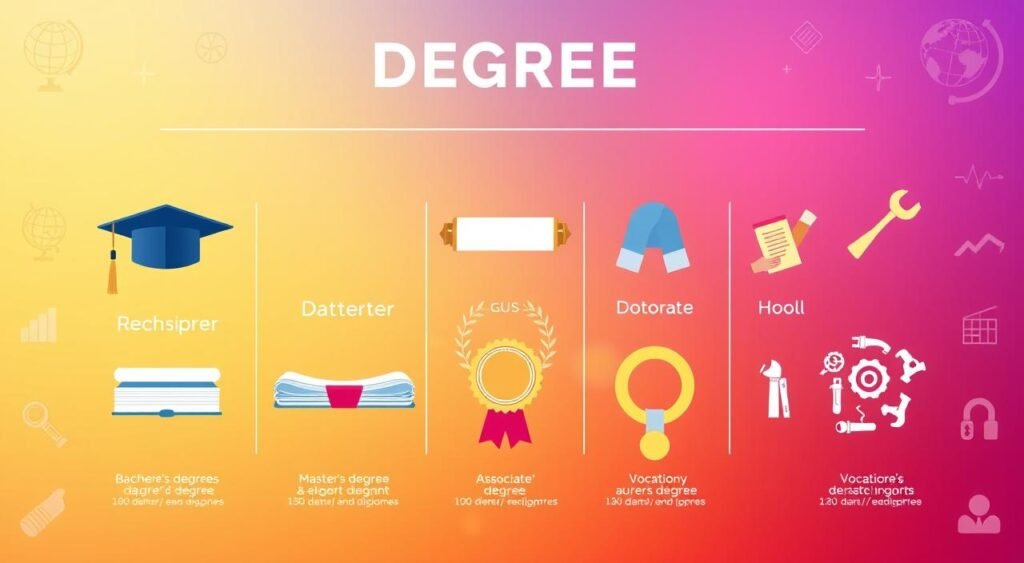Did you know people with a bachelor’s degree make, on average, $1.2 million more than those with just a high school diploma? Degrees play a huge role in career advancement, job market competitiveness, and professional development. This guide will show how degrees of all levels can help you succeed in today’s job market.

Associate degrees give you specialized skills, while advanced degrees lead to leadership roles. Knowing the differences between degree types is crucial for finding rewarding career opportunities. Let’s explore how degrees can change your career and how to get the most out of your education.
Table of Contents
Understanding Different Types of Degrees and Their Value
Exploring the world of education is key to your future career. From associate degrees to advanced certifications, each has its own value. Let’s see how these can shape your career.
Associate Degrees and Their Role in Career Development
Associate degrees are a smart, affordable way to start your career. These two-year programs focus on specific areas, like admin work or IT. They give you the skills to jump into entry-level jobs quickly.
Bachelor’s Degrees as Career Foundation
The bachelor’s degree is a cornerstone for many careers. These four-year programs build essential skills like critical thinking and communication. Whether in business or the arts, a bachelor’s degree sets you up for success.
Advanced Degrees and Specialized Certifications
Master’s degrees and doctoral degrees lead to advanced roles and leadership. They show deep knowledge in a field, making you stand out. Plus, professional certifications highlight specific skills, boosting your career prospects.

“The right degree can be the key to unlocking your fullest professional potential. Each qualification offers unique opportunities, so it’s important to carefully consider your career goals and the educational path that best aligns with them.”
How Degrees Shape Your Professional Opportunities
Getting a degree can change your career path and job chances. It opens up many professional doors that can shape your future.
Degrees can lead you to specific career paths. They give you the skills and knowledge needed for certain jobs. For example, an Engineering degree can lead to careers in product design or project management. A Nursing degree can lead to a fulfilling career in healthcare.
Also, degrees make you more appealing to employers. Many companies look for people with the right academic background. They see the value in the knowledge and skills you gain from school.
- Degrees help you develop the skills needed for certain roles, making you stand out.
- Going for a degree also gives you chances to network through campus events, internships, and connections with teachers and classmates.
- These industry connections are key for moving up in your career. They can lead to new job chances and mentorship.
In short, getting degrees can greatly influence your career path. It opens up more career paths, boosts your job prospects, helps in skill development, and gives you valuable networking opportunities and industry connections. Investing in your education is a crucial step towards a rewarding and successful career.

The ROI of Academic Degrees in Today’s Job Market
In today’s fast-changing job world, the worth of academic degrees is key for those aiming to boost their career and earnings. This part explores how degree levels affect salary, career growth, and the need for certain degrees in different fields.
Salary Potential Across Different Degree Levels
Getting a higher degree often means better pay. Research shows that those with master’s or doctoral degrees earn more than those with just a bachelor’s or associate’s degree. This is true in many fields, showing the value of investing in education to increase your income.
Long-term Career Advancement Prospects
Academic degrees offer more than just higher pay. They show employers that you’re dedicated, think critically, and have special skills. This can lead to leadership roles and career growth, making your job more rewarding and fulfilling over time.
Industry-Specific Degree Requirements
The job market needs a wide range of skills and qualifications. For example, healthcare looks for nursing, medical, or pharmaceutical degrees. Tech wants computer science, engineering, or IT degrees. Knowing what degrees are needed in your field can help you stay competitive and advance in your career.
Top 10 Facts about Degrees
FAQ
What are the different types of degrees and their respective values in the job market?
This section talks about the various degrees and their role in career growth. It looks at how associate degrees can start a career, the importance of bachelor’s degrees, and the benefits of advanced degrees and certifications. These can lead to better job opportunities and higher pay.
How do degrees influence professional opportunities and career paths?
Degrees can open doors to certain careers and improve job chances. They help develop skills and lead to networking and industry connections. These connections are key for moving up in your career.
What is the return on investment (ROI) of academic degrees in the current job market?
This section looks at the ROI of degrees, including salaries and career growth. It shows how different degrees affect earnings and career paths in various fields. This helps readers see the value of their education.
What is the impact of degrees on career advancement and earning potential?
This guide explores how degrees shape careers in today’s job market. It covers the effects of different degrees on job opportunities and earning potential. It shows how degrees can boost your salary and career prospects.
What are the key factors to consider when choosing a degree program?
When picking a degree, consider the career paths it opens, its impact on earnings, and the skills it teaches. Also, think about the networking and industry connections it can offer.
How can advanced degrees and specialized certifications contribute to career growth?
Advanced degrees and certifications boost career growth by adding specialized knowledge and skills. They increase earning potential and lead to more senior roles. These qualifications show deep expertise, especially in specialized fields.
